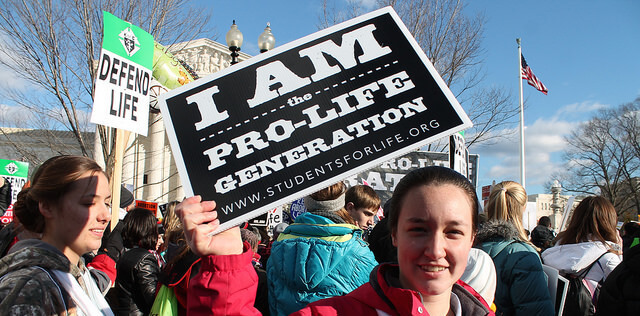A new Gallup poll reveals that for the first time since 2008, the majority of Americans identify as pro-choice—likely because laws around the country have stripped us of our options and access.
This article was made possible because of the generous support of DAME members. We urgently need your help to keep publishing. Will you contribute just $5 a month to support our journalism?
Gallup Polls released its annual findings on abortion views in America, and for the first time since 2008, a majority of the country identifies as “pro-choice.” That’s a massive blow for those who oppose abortion rights in general, and for the GOP specifically, who are learning that regardless of whether people agree with their abortion restrictions or not, they no longer want to be associated with the “pro-life” movement.
The shift in public sentiment from identifying as pro-life to pro-choice during that time period isn’t a coincidence. Just before the 2008 election, Gallup’s polling showed a nearly opposite picture from the one we see today, with 51 percent stating they were pro-life and 42 percent choosing pro-choice. Since that point in time, we saw the tea-party election wave of 2010, the massive introduction and passage of hundreds of state-level abortion restrictions beginning in 2011, the rise of the “Personhood” movement and multiple state referendums on potential full, no-exceptions abortion bans. Federally, the Republicans launched a congressional war against family planning, birth-control access, and even abortion in the case of rape or fetal anomalies.
“Pro-choice” hit its lowest point in 2012, before the real impact of these bills could be felt. But it bounced back now that clinic closures, three-day waiting periods, and “heartbeat” bans are dominating both the state houses and the news cycles across the country. It’s no coincidence that the more “choice” disappears as an actual reproductive possibility, the more people embrace it as a worthwhile option.
Not surprisingly, abortion opponents are reacting to the news by responding that a majority still oppose abortions, it is only that they are confused about whether or not they are really pro-choice or pro-life by definition.
“But do those labels on abortion actually mean Americans are pro-abortion?” writes Steven Ertelt at LifeNews.com. “It turns out the answer is no, as Gallup confirms a majority of Americans oppose all or almost all abortions. When asked when abortion should be legal, 54 percent of Americans oppose all abortions or say abortion should only be legal in a ‘few circumstances,’ typically defined as cases such as rape, incest or if the life of the mother is in danger. Since those cases constitute, at most, 1 to 2 percent of all abortion cases, Gallup’s numbers confirm 54 percent of Americans oppose 98 percent or more of the 1.1 million abortions that take place annually in the United States.”
Ertelt may be grasping at straws in his analysis, though. While he claims that it’s understood that “legal in only a few circumstances” means only during those minor exceptions, Gallup explicitly states that the people picking pro-choice are well aware that they are saying they support “broad” abortion rights. “While Gallup does not define the pro-choice and pro-life terms for Americans, their answers to a separate question about the legality of abortion indicate that those favoring the pro-choice label generally support broad abortion rights, while pro-life adherents mostly favor limited or no abortion rights,” the pollsters write.
Even assuming that Ertelt is correct, and that 53 percent of Americans really believe abortion should either be completely illegal or illegal in all but the rarest of situations, that could be even worse for anti-abortion activists. That would mean that the “pro-life” label has become so toxic even those who want abortion almost completely eliminated would prefer not to be affiliated with the pro-life movement.
If that is true, anti-abortion advocates have no one to blame it on but themselves. They’ve used the term “pro-life” while claiming that pregnant people would lie in order to access abortion services, or urging them to carry to term against their will. They’ve taken away abortion access for those with fatal fetal anomalies, urging them to give birth because “suffering is part of the human condition.” They’ve fought to try people for murder when their babies don’t survive long after birth. And they charge teens for child neglect for giving birth early, alone and afraid, and not getting medical care fast enough, all while refusing them the type of comprehensive sex-ed or prenatal care that would help them to have healthy pregnancies or prevent those pregnancies in the first place.
Gallup labels this new trend a “pro-choice rebound.” In reality, it’s a signal of exactly how far social conservatives have overstepped in the last five years when it comes to eliminating the right to a safe, legal abortion. While they were focused on small, incremental changes at the fringe of abortion access such as parental notification or the so-called “partial birth” abortion ban, they were successful in winning public support. But since 2011 they moved too hard, and too fast, and the backlash is beginning.
The question is, will this “rebound” be felt at the polls, and can some of the ground that was lost in the last five years be regained. Or is it already too late to turn back the laws that have made so many pro-choice Americans learn that there is really no choice accessible at all?
Photo by Flickr user Elvert Barnes
